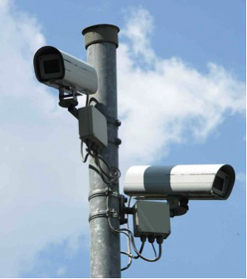Video surveillence has proven itself to be an advanced sensor with benefits.

Serving as a remote set of eyes, video surveillance allows a virtual presence in off-site locations from a single point. What’s more, video cameras cover a large contiguous swath of view, allowing a panning camera to steadily and consistently sweep a search pattern.
Video systems can also function in locations where humans cannot. The earliest known video surveillance technology was used to safely monitor the development and launch of V-2 rockets in 1942. From a safe distance, scientists and engineers could observe performances and identify failures.
Since then, video systems have acted as an extension of our eyes and ears. A steady stream of technology developments and manufacturing advancements have taken video surveillance to such a level that we feel comfortable relying on it for security purposes.
First Light
Light-sensitive materials can change their resistance or conductance based on the presence or absence of light. Early monochrome video systems like the RCA Vidicon camera system of the 1950s involved vacuum tubes featuring a light-sensitive selenium plate that acted as the focus of the image to be sensed.
Read the rest of the article at Mouser.com
Advertisement
Learn more about Mouser Electronics





